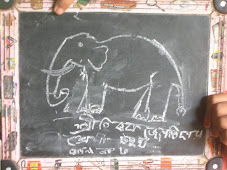Due to poor performance by the Assamese SSA Ministry in 2007, in addition to teachers’ heavy skepticism of SSA programs, in August 2008 “Porhim, Hikim” will partner only with UNICEF in an effort to win stronger teacher support. This time around Pratham and UNICEF will target specific Tea Garden schools in 11districts in Assam. Tea Garden Communities are mostly populated by laborers who are generally paid poorly to work in tea gardens collecting tea leaves. Tea Garden Communities are a very large population of Assam, as it is estimated that Assam provides 1/6 of the world’s tea.

[An Assamese Tea Garden]
However, before teacher training begins in August the Assam state team has taken on the major task of putting on summer camps in 22 of 23 Districts in Assam, and the massive mobilization of people underway here for the summer camps is incredible. In mid-April this year, the ~40 Pratham District Coordinators (DCs) hired a total of 423 “Cluster” Coordinators (CCs) [note: a “cluster” is defined as about 40-50 schools] to work for 4 months to mobilize thousands of volunteers in rural Assam and oversee the successful implementation of summer camps in their clusters.
Pratham Assam’s summer camp objectives are the same as other camps I have visited: to raise children’s comprehension up 1 level in reading and mathematics.
Tomorrow Ashok and I head out to visit the autonomous District of Kokrajhar as they are having a special inauguration of the summer camps for the District, and they expect many local officials to come out for it.
______________________________________________________
www.pratham.org
www.readindia.org
www.prathamusa.org












